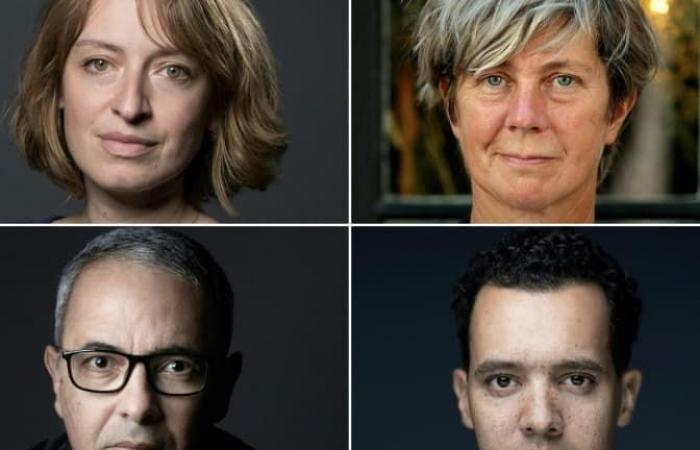The most prestigious French-speaking literary prize must be awarded to Kamel Daoud, Gaël Faye, Sandrine Collette or Hélène Gaudy on Monday at the Drouant restaurant in Paris.
The final of the Prix Goncourt on Monday is widely seen as a face to face between Kamel Daoud and Gaël Faye, two authors exploring the recent wounds of Algeria and Rwanda, unless Sandrine Collette or Hélène Gaudy creates a surprise.
The most prestigious French-speaking literary prize must be awarded to one of these four authors at midday at the Drouant restaurant in Paris, as has been the tradition since the 1914 edition of Goncourt.
This election, decided by ten jurors, risks being squeezed between two fictions, Houris (editions Gallimard), on the massacres of the Algerian “black decade”, and Jacaranda (Editions Grasset), on the post-genocide in Rwanda.
According to six literary journalists interviewed by Livres Hebdo, Kamel Daoud is the favorite. There are five to see him crowned, including one of them who suggests that two jurors “recently changed sides”, in favor of the Franco-Algerian author.
In the Parisian publishing world, we hear this same prognosis come up very often. “Kamel Daoud will have it, for reasons not literary, but political,” according to an editor who spoke on condition of anonymity to AFP.
Algeria’s decision to ban Gallimard Editions from the Algiers International Book Fair, from November 6 to 16, could have worked in its favor.
“Appeal”
According to another editor, Gaël Faye would have “the profile of the ideal Goncourt”. Namely very popular, author of a bestseller adapted for cinema (Small country), and, which would be a first in a list dominated by bourgeois writers of a certain age, musician, singer and slammer.
The two authors of the last square, Sandrine Collette with Madelaine before dawn (editions JC Lattès), and Hélène Gaudy with Archipelagos (editions of L’Olivier), are outsiders.
“They can serve as a remedy if the jury cannot reach an agreement. Especially Sandrine Collette,” said an editor interviewed by AFP.
The novelist who made her mark in the noir novel is a favorite for the daily Le Parisien, which loved her story of a wild child whose arrival shakes up a village.
Important data: the last two finals went to the maximum of 14 rounds, with five votes for one contender, and five votes for the other. In this case, the voice of the president of the jury counts double, in this case Didier Decoin in 2022 and 2023. However, this president has changed.
Philippe Claudel, elected to this position in May, privately made it clear that he would do everything possible to avoid this scenario. He could push towards a negotiated solution if the first round were to give five votes to a contender and five votes to a rival.
Another fact to take into account: during these two elections in 14 rounds, Gallimard editions were beaten.
Iconic patterns
In 2022, Giuliano Da Empoli had suffered from having already won the Grand Prix du roman of the French Academy, while Brigitte Giraud (Live fastat Flammarion) had the sympathy of five faithful jurors.
In 2023, the awarding of the Femina prize to a Goncourt finalist, Neige Sinno, reshuffled the cards on the eve of the election, in favor of Jean-Baptiste Andrea (Watch over herat L’Iconoclaste).
In 2024, the situation is slightly different: the Madrigall group, parent company of Editions Gallimard, bet everything on Goncourt and did not obtain any prize before this final.
This is a clash at the top between the two most emblematic and influential bosses of Parisian publishing, veterans of literary prizes, always very involved in defending their foals at the start of the school year: Antoine Gallimard, heir to the house founded by his grandfather Gaston, and Olivier Nora, who has managed Grasset since 2000.
Gallimard’s last Goncourt prize dates back to 2020, and Grasset’s last in 2005, the longest drought for this house since the 1960s.






